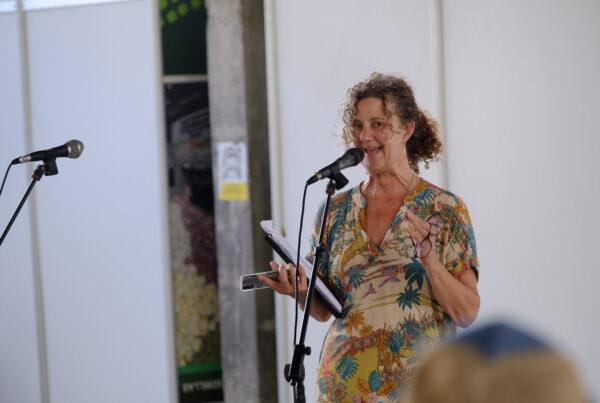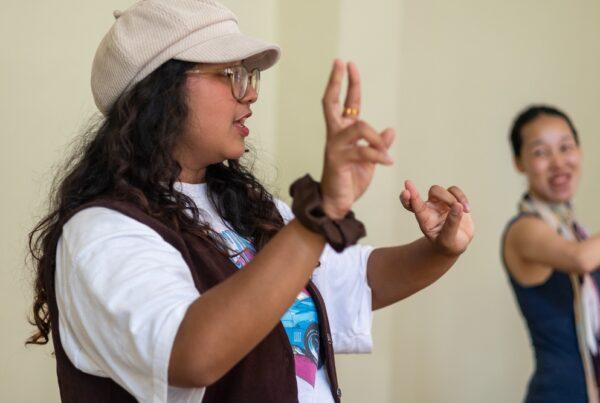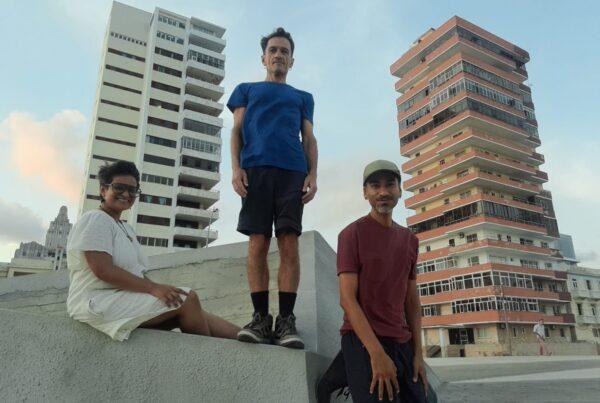The Open Market, which took place on the last day of the Artistic Gathering, offered attendees the opportunity to meet colleagues from different professional networks, national centres, young generation of artists as well as local initiatives from Serbia and the region and hear their ideas, proposals for collaboration, as well as their challenges and strategies.
As part of the programme, a panel session entitled ‘How to Manage Terrible Conditions – Perspectives of Young Artists’ panned out as an interesting debate between practitioners, professors, colleagues and more importantly perhaps, youth who were sitting in the audience.
The initial discussion introduced panelists, their work as actors and practitioners as well as a professor of an Academy of Arts in Novi Sad, while the many local challenges that artists face when trying to materialise their practice, in particular with working with young children quickly came to light.
Emphasis was paid to the fact that regardless of the numerous professionals in the field, both young and old, one of the biggest challenges they face locally is the lack of space to materialise their work and explore their practice further. With a lot of them being out of work and having to go at it as independent practitioners, even students are finding it difficult to find spaces to work in, aside the facilities of their academies.
“Ask anyone present if there’s a possibility to come to their space with 110 children which I now teach in my studio,” said Ibro Sakić, drama pedagogue. He estimated that his work’s success is obvious to the local community and that nothing negative has ever been said about his work, but that the lack of space is a long standing problem.

Sonja Leštar expressed the reality that there are no auditions to apply for, or at least not enough and addressing the youth, gave them quite a matter of fact reality that they may begin their artistic career with very little support.
To this end, the professor Momčilo Miljković on the panel was asked how he, as part of an academy, prepares his students for this reality, admited he himself faced the same issues when he was studying, and emphasised that he wasn’t prepared for what to expect once he was out in the field.
To this end, he admitted that he began preparing his own students for what to expect, so that they have no illusions, and focuses on how they can use their knowledge and find themselves as independant professionals in the field. He assists them in writing their own projects and grants and where possible, funding for them to be able to work on their own ideas.
It was striking how the conversation eventually turned to the floor where a number of youth with the desires to study or already in the process of studying acting were listening. “I don’t have the answer,” said one of the youth who is wanting to enter the field, “I find it egoistical that our generation is going to change things, every generation thinks they’re going to change things. I don’t know what to expect and I don’t think it’s smart to lean on the community, we are shown to exist as individuals.” Another youth mentioned that she has received conflicting opinions about going into the world of acting. “On the one hand is the attachment to the love of theatre and continuing to do your best, and on the other, is the fear of getting worn out. So it’s about deciding wether I should study acting or go into something more secure and it’s hard to say, I have big hopes in going into acting in Serbia but perhaps the safest option is to go abroad.”
One of the audience members was a youth already studying at an Academy of Arts in Novi Sad. “I fell in love with theatre many years ago, but I don’t know if it’s going to be my profession anymore. There aren’t enough opportunities, we are a small community in the theatre world; it’s sad how careers in theatres are now considered less ambitious.”

Eventually the conversation turned more hopeful. Notably, Diana Kržanić Tepavac, President of ASSITEJ Serbia also took to the floor and expressed her trust in the youth and that they will continue to flourish in the field regardless of the difficulties. She also estimated that giving them a realistic overview of what to expect is one thing, but acknowledging that having a critical mass, as she said, meaning more voices that highlight the challenges will bring an outcome.
An audience member from Lithuania also pinpointed the importance of learning managerial skills in the Academy for artists to be able to lead an independent profession. She talked about learning self-management, self-presentation, leaning how to write proposals and build a portfolio, something she was personally taught during her studies in her own country.
A producer from Belgium backed this up and stressed the importance to organise themselves as artists and the benefits of structuring themselves; he estimates that through the process of organising themselves they would get to know first hand what they want to say and that this will help them in their approach to the market.

Melissa Hekkers is a freelance journalist and author.
Her most recent book, Amir’s Blue Elephant, a creative non-fiction based on her experiences working in the Moria refugee camp in Lesvos, Greece and Cyprus. In 2018, she launched the My Cyprus Mandala Series, colouring books inspired by the natural and cultural heritage of Cyprus. In 2007, she published her first children’s book in both English and Greek entitled Crocodile, which won the Cyprus State Illustration Award. In 2012, she launched her second children’s book Flying across Red Skies (in English and Greek), using an experimental approach to literature, for which she was nominated for the Cyprus State Literary award. Her third, similarly well-received children’s book was Pupa (Greek and English), published in 2014 and was adapted as a theatre play in 2019. In between her last two books, she published her first free-verse poetry book entitled Come-forth. In 2019 she was contributing author to the anthology Nicosia Beyond Barriers: Voices from a Divided City, published by Saqi Books, London.





